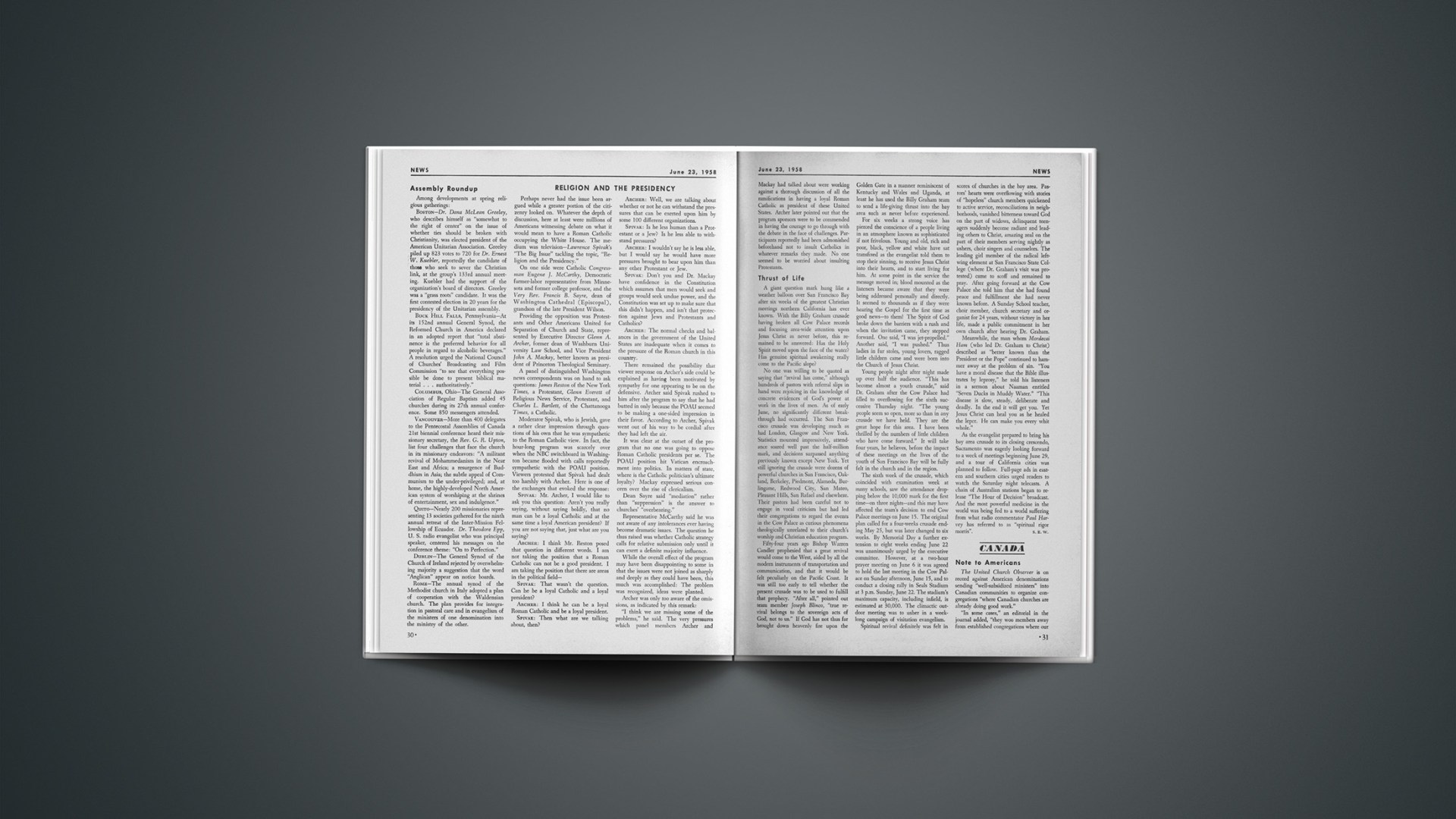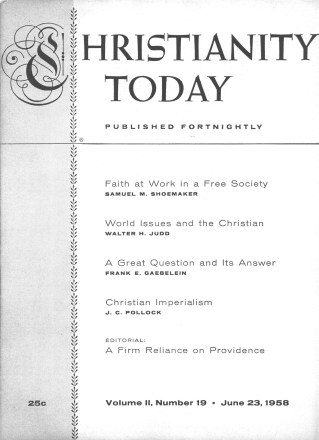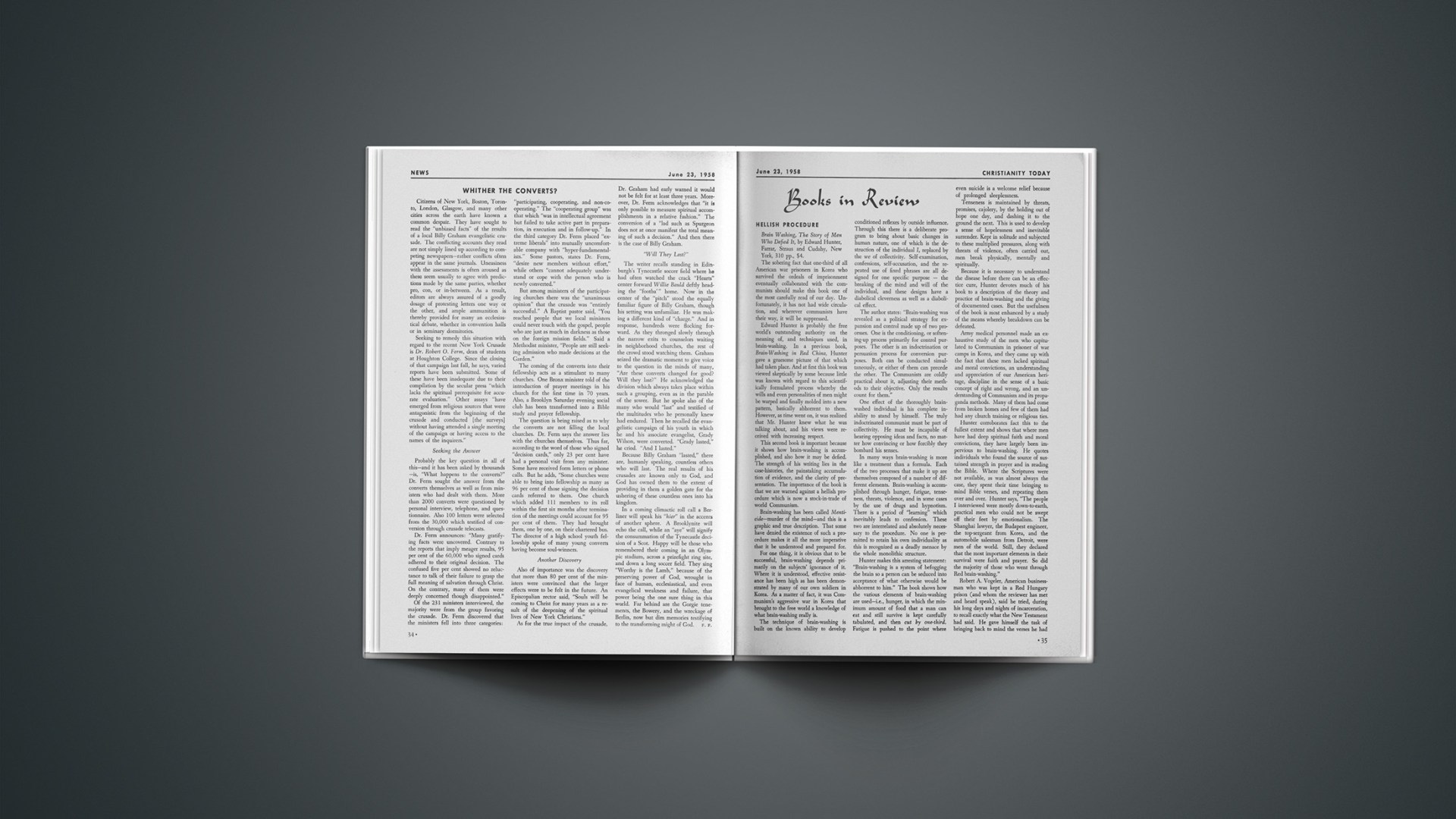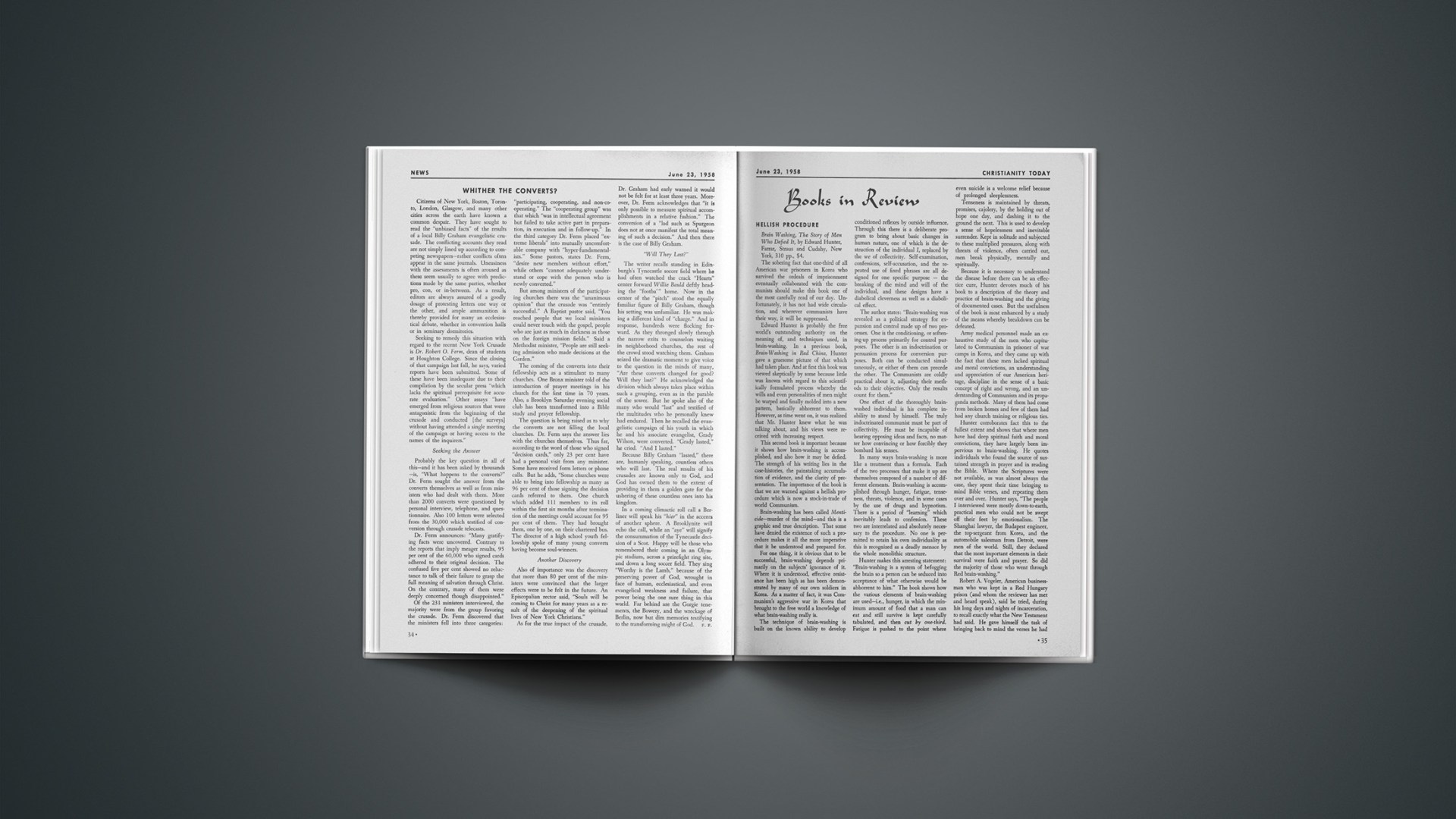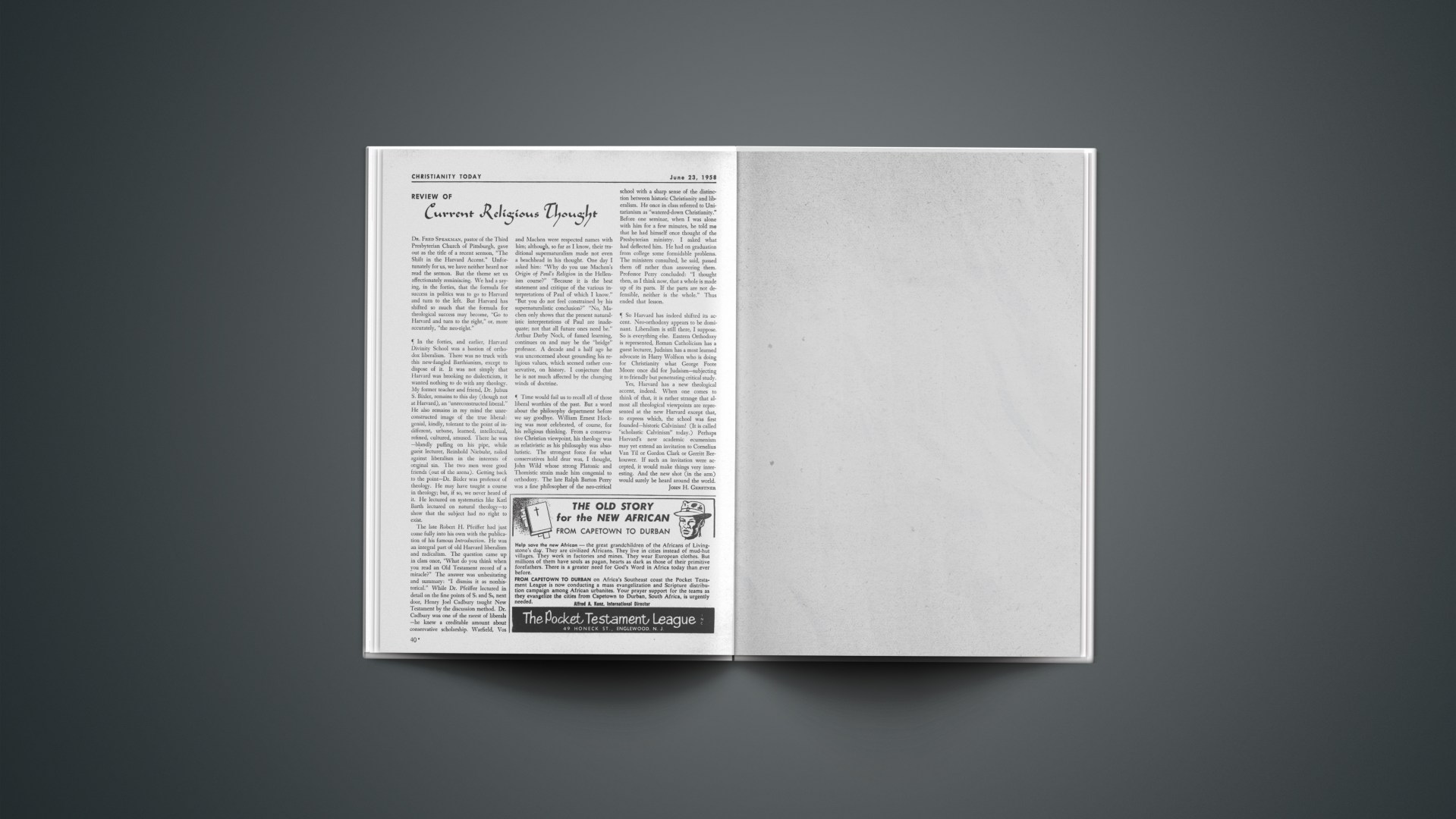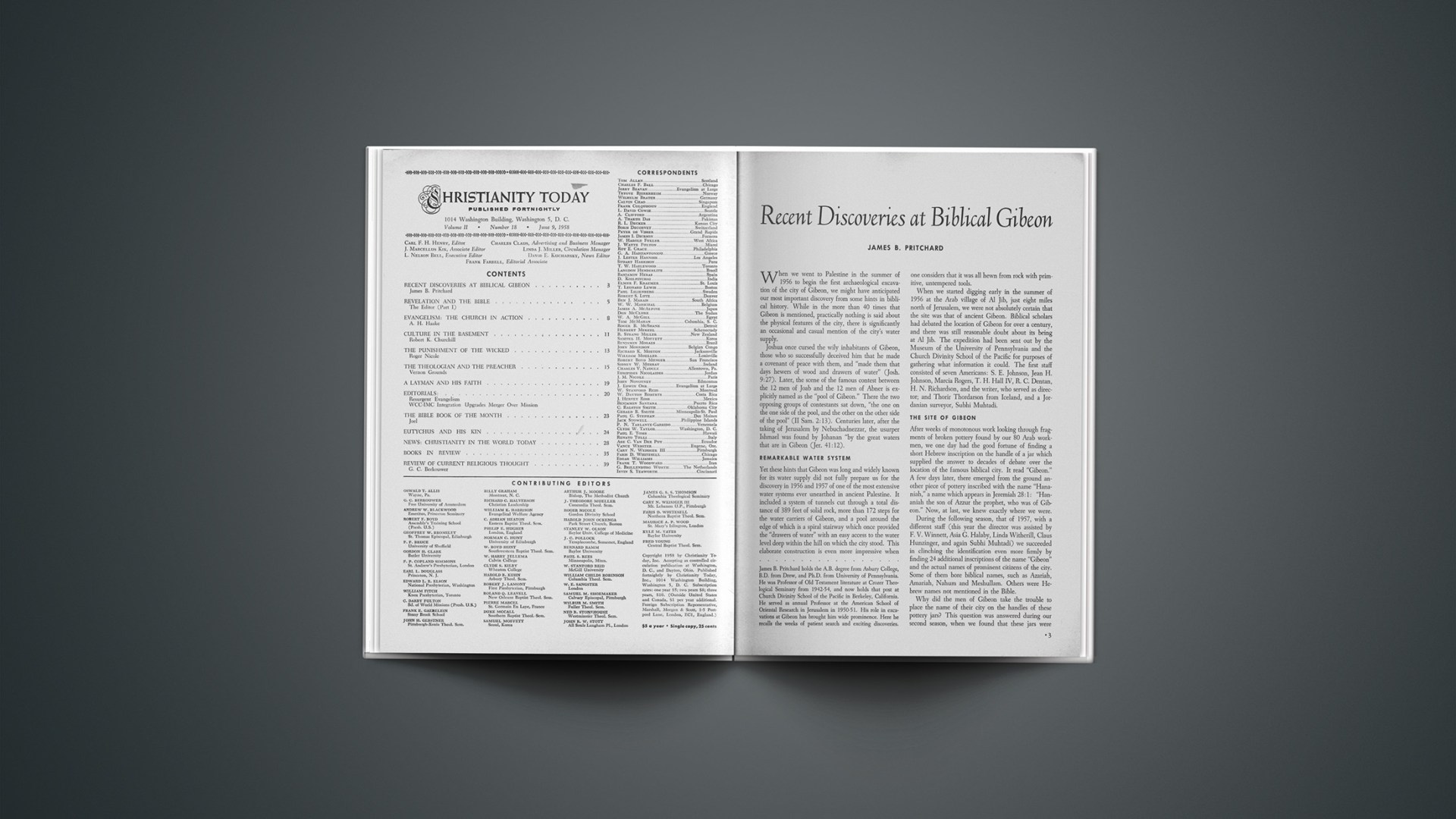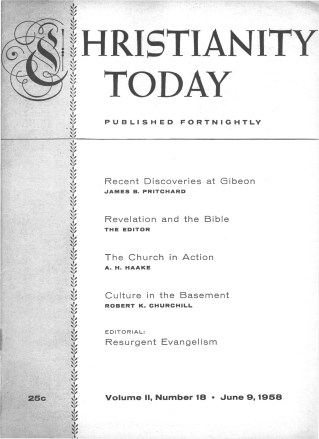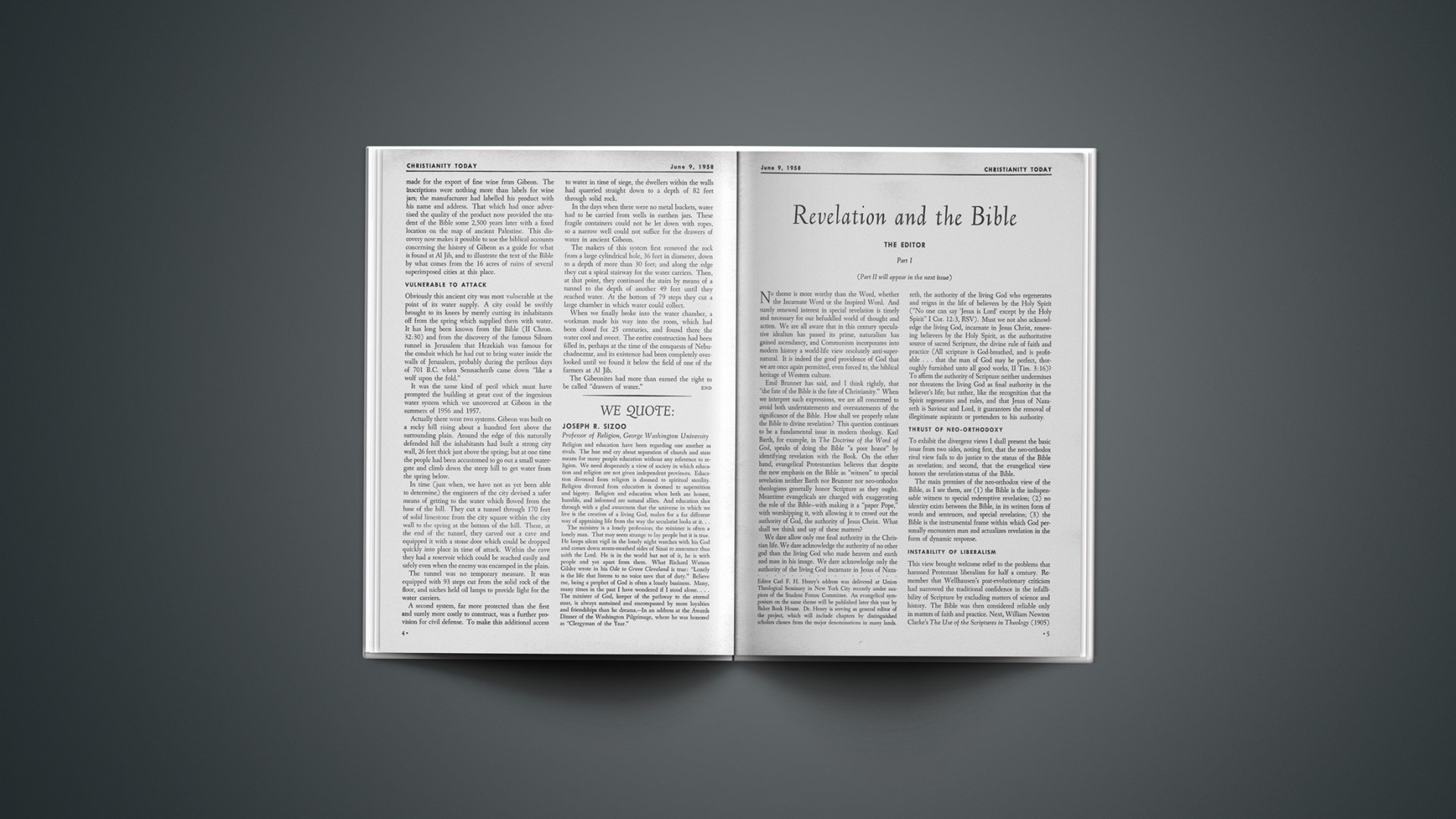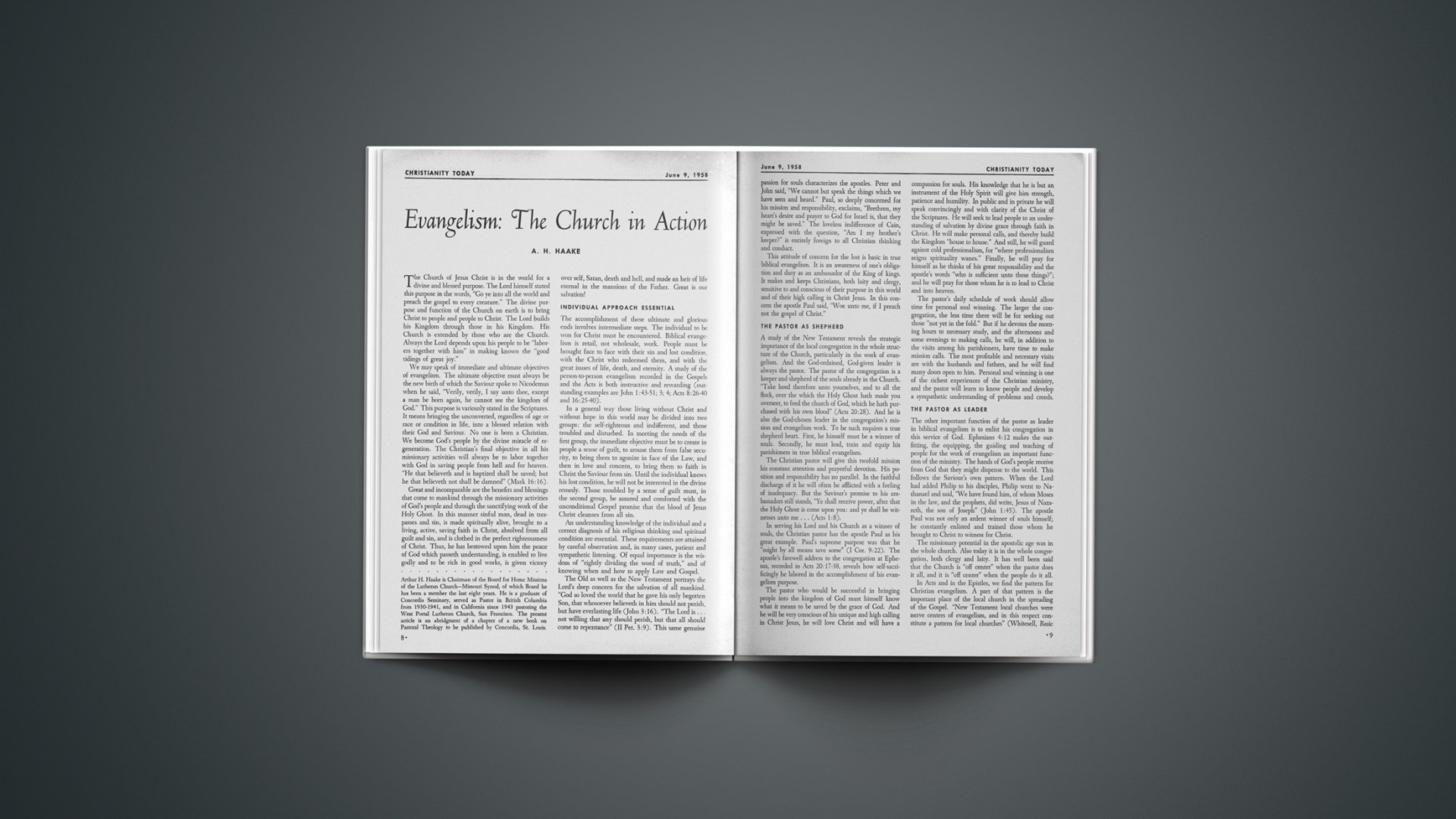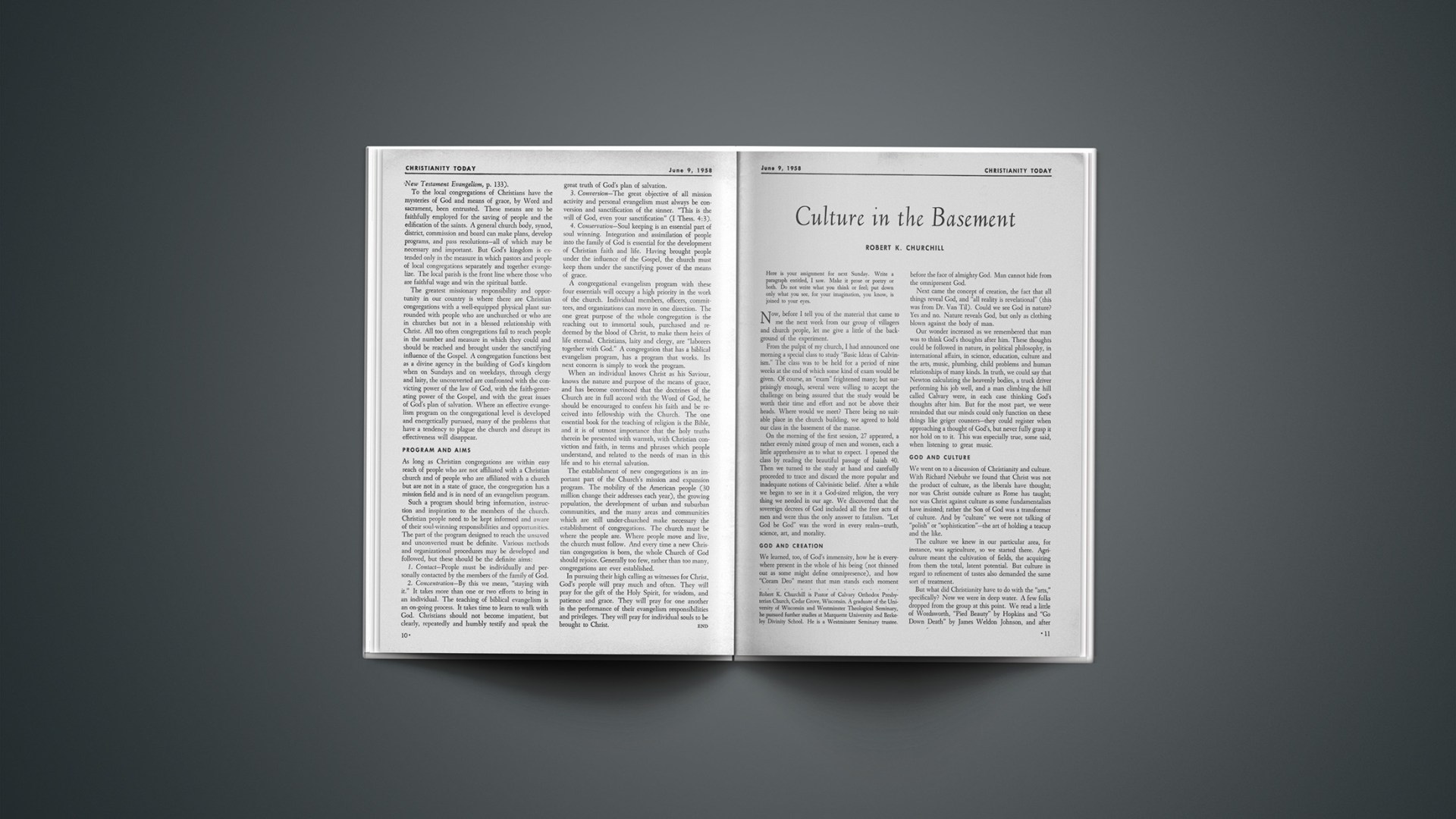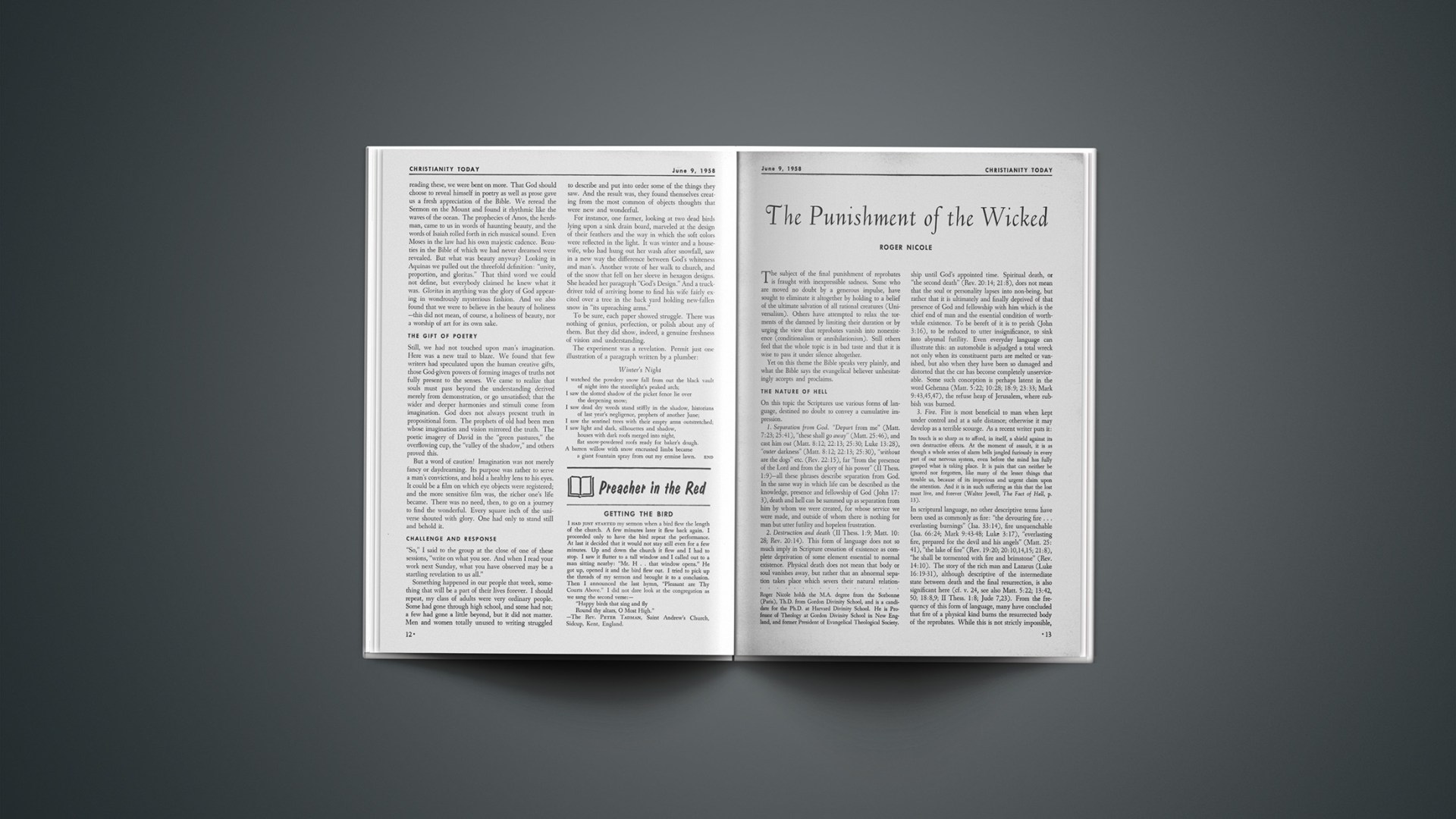Perhaps never had the issue been argued while a greater portion of the citizenry looked on. Whatever the depth of discussion, here at least were millions of Americans witnessing debate on what it would mean to have a Roman Catholic occupying the White House. The medium was television—Lawrence Spivak’s “The Big Issue” tackling the topic, “Religion and the Presidency.”
On one side were Catholic Congressman Eugene J. McCarthy, Democratic farmer-labor representative from Minnesota and former college professor, and the Very Rev. Francis B. Sayre, dean of Washington Cathedral (Episcopal), grandson of the late President Wilson.
Providing the opposition was Protestants and Other Americans United for Separation of Church and State, represented by Executive Director Glenn A. Archer, former dean of Washburn University Law School, and Vice President John A. Mackay, better known as president of Princeton Theological Seminary.
A panel of distinguished Washington news correspondents was on hand to ask questions: James Reston of the New York Times, a Protestant, Glenn Everett of Religious News Service, Protestant, and Charles L. Bartlett, of the Chattanooga Times, a Catholic.
Moderator Spivak, who is Jewish, gave a rather clear impression through questions of his own that he was sympathetic to the Roman Catholic view. In fact, the hour-long program was scarcely over when the NBC switchboard in Washington became flooded with calls reportedly sympathetic with the POAU position. Viewers protested that Spivak had dealt too harshly with Archer. Here is one of the exchanges that evoked the response:
SPIVAK: Mr. Archer, I would like to ask you this question: Aren’t you really saying, without saying boldly, that no man can be a loyal Catholic and at the same time a loyal American president? If you are not saying that, just what are you saying?
ARCHER: I think Mr. Reston posed that question in different words. I am not taking the position that a Roman Catholic can not be a good president. I am taking the position that there are areas in the political field—
SPIVAK: That wasn’t the question. Can he be a loyal Catholic and a loyal president?
ARCHER: I think he can be a loyal Roman Catholic and be a loyal president.
SPIVAK: Then what are we talking about, then?
ARCHER: Well, we are talking about whether or not he can withstand the pressures that can be exerted upon him by some 100 different organizations.
SPIVAK: Is he less human than a Protestant or a Jew? Is he less able to withstand pressures?
ARCHER: I wouldn’t say he is less able, but I would say he would have more pressures brought to bear upon him than any other Protestant or Jew.
SPIVAK: Don’t you and Dr. Mackay have confidence in the Constitution which assumes that men would seek and groups would seek undue power, and the Constitution was set up to make sure that this didn’t happen, and isn’t that protection against Jews and Protestants and Catholics?
ARCHER: The normal checks and balances in the government of the United States are inadequate when it comes to the pressure of the Roman church in this country.
There remained the possibility that viewer response on Archer’s side could be explained as having been motivated by sympathy for one appearing to be on the defensive. Archer said Spivak rushed to him after the program to say that he had butted in only because the POAU seemed to be making a one-sided impression in their favor. According to Archer, Spivak went out of his way to be cordial after they had left the air.
It was clear at the outset of the program that no one was going to oppose Roman Catholic presidents per se. The POAU position hit Vatican encroachment into politics. In matters of state, where is the Catholic politician’s ultimate loyalty? Mackay expressed serious concern over the rise of clericalism.
Dean Sayre said “mediation” rather than “suppression” is the answer to churches’ “overbearing.”
Representative McCarthy said he was not aware of any intolerances ever having become dramatic issues. The question he thus raised was whether Catholic strategy calls for relative submission only until it can exert a definite majority influence.
While the overall effect of the program may have been disappointing to some in that the issues were not joined as sharply and deeply as they could have been, this much was accomplished: The problem was recognized, ideas were planted.
Archer was only too aware of the omissions, as indicated by this remark:
“I think we are missing some of the problems,” he said. The very pressures which panel members Archer and Mackay had talked about were working against a thorough discussion of all the ramifications in having a loyal Roman Catholic as president of these United States. Archer later pointed out that the program sponsors were to be commended in having the courage to go through with the debate in the face of challenges. Participants reportedly had been admonished beforehand not to insult Catholics in whatever remarks they made. No one seemed to be worried about insulting Protestants.
Thrust Of Life
A giant question mark hung like a weather balloon over San Francisco Bay after six weeks of the greatest Christian meetings northern California has ever known. With the Billy Graham crusade having broken all Cow Palace records and focusing area-wide attention upon Jesus Christ as never before, this remained to be answered: Has the Holy Spirit moved upon the face of the water? Has genuine spiritual awakening really come to the Pacific slope?
No one was willing to be quoted as saying that “revival has come,” although hundreds of pastors with referral slips in hand were rejoicing in the knowledge of concrete evidences of God’s power at work in the lives of men. As of early June, no significantly different break-through had occurred. The San Francisco crusade was developing much as had London, Glasgow and New York. Statistics mounted impressively, attendance soared well past the half-million mark, and decisions surpassed anything previously known except New York. Yet still ignoring the crusade were dozens of powerful churches in San Francisco, Oakland, Berkeley, Piedmont, Alameda, Burlingame, Redwood City, San Mateo, Pleasant Hills, San Rafael and elsewhere. Their pastors had been careful not to engage in vocal criticism but had led their congregations to regard the events in the Cow Palace as curious phenomena theologically unrelated to their church’s worship and Christian education program.
Fifty-four years ago Bishop Warren Candler prophesied that a great revival would come to the West, aided by all the modern instruments of transportation and communication, and that it would be felt peculiarly on the Pacific Coast. It was still too early to tell whether the present crusade was to be used to fulfill that prophecy. “After all,” pointed out team member Joseph Blinco, “true revival belongs to the sovereign acts of God, not to us.” If God has not thus far brought down heavenly fire upon the Golden Gate in a manner reminiscent of Kentucky and Wales and Uganda, at least he has used the Billy Graham team to send a life-giving thrust into the bay area such as never before experienced.
For six weeks a strong voice has pierced the conscience of a people living in an atmosphere known as sophisticated if not frivolous. Young and old, rich and poor, black, yellow and white have sat transfixed as the evangelist told them to stop their sinning, to receive Jesus Christ into their hearts, and to start living for him. At some point in the service the message moved in; blood mounted as the listeners became aware that they were being addressed personally and directly. It seemed to thousands as if they were hearing the Gospel for the first time as good news—to them! The Spirit of God broke down the barriers with a rush and when the invitation came, they stepped forward. One said, “I was jet-propelled.” Another said, “I was pushed.” Thus ladies in fur stoles, young lovers, ragged little children came and were born into the Church of Jesus Christ.
Young people night after night made up over half the audience. “This has become almost a youth crusade,” said Dr. Graham after the Cow Palace had filled to overflowing for the sixth successive Thursday night. “The young people seem so open, more so than in any crusade we have held. They are the great hope for this area. I have been thrilled by the numbers of little children who have come forward.” It will take four years, he believes, before the impact of these meetings on the lives of the youth of San Francisco Bay will be fully felt in the church and in the region.
The sixth week of the crusade, which coincided with examination week at many schools, saw the attendance dropping below the 10,000 mark for the first time—on three nights—and this may have affected the team’s decision to end Cow Palace meetings on June 15. The original plan called for a four-weeks crusade ending May 25, but was later changed to six weeks. By Memorial Day a further extension to eight weeks ending June 22 was unanimously urged by the executive committee. However, at a two-hour prayer meeting on June 6 it was agreed to hold the last meeting in the Cow Palace on Sunday afternoon, June 15, and to conduct a closing rally in Seals Stadium at 3 p.m. Sunday, June 22. The stadium’s maximum capacity, including infield, is estimated at 30,000. The climactic outdoor meeting was to usher in a week-long campaign of visitation evangelism.
Spiritual revival definitely was felt in scores of churches in the bay area. Pastors’ hearts were overflowing with stories of “hopeless” church members quickened to active service, reconciliations in neighborhoods, vanished bitterness toward God on the part of widows, delinquent teenagers suddenly become radiant and leading others to Christ, amazing zeal on the part of their members serving nightly as ushers, choir singers and counselors. The leading girl member of the radical left-wing element at San Francisco State College (where Dr. Graham’s visit was protested) came to scoff and remained to pray. After going forward at the Cow Palace she told him that she had found peace and fulfillment she had never known before. A Sunday School teacher, choir member, church secretary and organist for 24 years, without victory in her life, made a public commitment in her own church after hearing Dr. Graham.
Meanwhile, the man whom Mordecai Ham (who led Dr. Graham to Christ) described as “better known than the President or the Pope” continued to hammer away at the problem of sin. “You have a moral disease that the Bible illustrates by leprosy,” he told his listeners in a sermon about Naaman entitled “Seven Ducks in Muddy Water.” “This disease is slow, steady, deliberate and deadly. In the end it will get you. Yet Jesus Christ can heal you as he healed the leper. He can make you every whit whole.”
As the evangelist prepared to bring his bay area crusade to its closing crescendo, Sacramento was eagerly looking forward to a week of meetings beginning June 29, and a tour of California cities was planned to follow. Full-page ads in eastern and southern cities urged readers to watch the Saturday night telecasts. A chain of Australian stations began to release “The Hour of Decision” broadcast. And the most powerful medicine in the world was being fed to a world suffering from what radio commentator Paul Harvey has referred to as “spiritual rigor mortis”.
S. E. W.
Canada
Note To Americans
The United Church Observer is on record against American denominations sending “well-subsidized ministers” into Canadian communities to organize congregations “where Canadian churches are already doing good work.”
“In some cases,” an editorial in the journal added, “they woo members away from established congregations where our own mission boards have insisted that the people pay their own way.”
Other Dominion developments:
—Four thousand persons met in Toronto’s Varsity Arena to honor Dr. Oswald J. Smith on the occasion of the People’s Church pastor’s 50th anniversary in the ministry.
—Canadian Girls in Training, Christian youth organization, reports that its enrollment has tripled in the past 15 years. There are now 3,000 members.
South America
Auca Explorer
Two years ago, shortly after the five American missionaries were slain by Auca Indians in Ecuador, a Canadian explorer-doctor arrived on the jungle scene. He was Dr. Robert Tremblay, formerly on the staff of a Montreal hospital, who said he wanted to reach savage Aucas for the Protestant cause. Missionaries, not convinced of his devotion, discouraged Tremblay, whereupon he turned himself over to Roman Catholics.
This spring, Protestant missionaries in Ecuador again heard from Tremblay. He charged that two Auca women who fled their savage tribe last year were being held against their will by Protestants. He accused missionaries of having taken the women captive by craft. (The Ecuadorian government has not recognized the charges.)
Tremblay then announced a jungle expedition of his own. He said he was going to meet the Aucas. He is reported to have said that if they came out peaceably, he would dope them and take them away. If they acted warlike, he allegedly vowed to kill them all. Tremblay had some threats for Protestants, too: He said he would shoot down any Missionary Aviation Fellowship plane that flew over where he happened to be.
Native burden bearers accompanied him to the beach where the five were slain. He proceeded from that point alone, with no communications equipment. A search party was organized for him some weeks later. As of early June, there had been no word as to his whereabouts or well-being.
Europe
Needed: Scholarship
“Our evangelists must be theologians and our theologians evangelists,” Dr. D. Martyn Lloyd-Jones quoted Professor James Denney’s dictum of a half-century ago in an address given at the dedication of the new headquarters of the London Bible College. The address stressed the continuing need for institutions standing for great evangelical truths to train students for home and foreign ministries.
Planned in 1938 as an interdenominational college “devoted to evangelical scholarship of the highest standard possible,” London Bible College began in 1944.
Ceremonies attending the dedication of the new building included a series of lectures by Professor E. J. Young of Westminster Theological Seminary, Philadelphia.
S. W. M.
Worth Quoting
“The Kremlin, as an outward show, does grant freedom of worship now. But the communist rulers have in progress an ingenious, diabolical plan that is killing the Christian church at its roots.”—Dr. Bob Pierce, president of World Vision, Inc., upon return from a visit to Russia.
Middle East
Turkish Trends
According to its constitution, Turkey is a secular state. But the overwhelming majority of Turks are adherents of Islam, a faith which claims authority over all society, governments included.
Until 1946, conflict between Islamic forces and those supporting secularity in government was at a minimum. Only one political party was permitted, and that one was dominated by a single leader.
In 1946, permission was granted for opposition parties. Since then, tremendous political pressure represented by millions of Muslim voters has been making itself felt increasingly. Most political leaders are trying, probably sincerely, to preserve the secular nature of the government. However, to prevent religious fanatics from gaining political power, they are obliged to grant concessions to Islam. Voters are thus satisfied.
For example, the teaching of religion is now a part of government school curriculum; there are schools for prayer leaders and preachers; Ankara University has a school of theology. All these represent developments aimed at keeping control of religious affairs by granting controlled concessions.
As religious leaders realize their potential political influence, they feel much more free to express religious convictions. Mosque attendance seems to be increasing. New religious periodicals are appearing. In the face of increasing fanaticism on the part of the general public, non-Muslim minorities are beginning to feel increasingly secure.
Two recent events, nevertheless, illustrate that the government still is trying to maintain its secular character.
The first event was the dedication, April 26, of a new house of worship for an Istanbul Christian congregation. The ceremony represented a triumph of patience and faith over seemingly insurmountable obstacles. The decision to allow construction of a Christian church could have spelled political suicide for responsible authorities. But they relented to a persevering congregation.
The building, inconspicuously located in a quiet residential district, looks much like neighboring apartment buildings. A sanctuary seating 200 is flanked by rooms for church school and young peoples’ programs.
The second event was the suppression of activities of an organization obviously reactionary Islamic. The government moved under laws forbidding secret religious orders. Apparently some of the organization’s circulated tracts advocated the overthrow of democratic reforms. Newspapers announced the curtailment.
Such open suppression of Islamic groups looks like the loss of thousands of votes for the government. However, had officials not acted, a threat to the principle of secularity in government would have gone unchecked. Apparently the government is determined to stay secular at any cost.
Hospital Fire
A spectacular fire in the south wing of Jerusalem’s Augusta Victoria Hospital failed to interrupt patient care in other sections of the building operated by the Lutheran World Federation.
The big hospital located on the Mount of Olives was only partially evacuated despite heavy smoke which poured through the roof.
The National Lutheran Council said the preliminary damage estimate was $112,000. More than 3,000 persons were said to have battled the fire for seven hours. No casualties were reported among patients or fire-fighters.
Rabbi Seat
The Seat of the Chief Rabbinate of Israel was dedicated in Jerusalem last month. More than a thousand persons, including rabbis from all over the world, witnessed the opening of the modernistic Jewish religious center, Hechal Shlomo.
A message from Prime Minister David Ben-Gurion expressed the hope “(a) that the public religious requirements of the inhabitants of Israel shall be met through the resources of the state; (b) that there shall be no coercion, either religious or anti-religious, in religious matters.”
“My greeting to you,” said the prime minister, “is that your institution may be overflowing with love for Israel, and may become a source for the consolidation of our people, the abolition of communal barriers, integration in the historic heritage of the Jewish people, and loyal devotion to the vision of Messianic redemption, for the Jewish people and for all humanity.”
Hope For Childless
The Israel Digest reports development of a method of therapeutic insemination that may enable many infertile men to become fathers. The method involves use of donors’ cell-free seminal plasma and enables the husband to become the true biological father of his child, according to the report.
Investigations of the discovering physician had been directed towards solving the problem of couples who are childless because the husband’s semen contains too few spermatozoa.
Asia
New Ministers
Korea’s Protestant seminaries topped all other Asian countries in turning out new Protestant ministers this spring. In addition to 290 graduates of major seminaries, an uncounted number of diplomas were conferred by lesser known theological schools and Bible institutes.
Here is a breakdown of graduates: Presbyterian Theological Seminary 112, Seoul Seminary (Holiness) 69, Methodist Theological Seminary 52, Hankuk Seminary (R. O. K. Presbyterian) 44, Pusan Seminary (Koryu Presbyterian) 21.
S. H. M.
Honor Statue
A new statue of its president graces the grounds of Ewha Woman’s University in Korea. The statue honors Dr. Helen Kim, Korea’s most famous woman educator and outstanding Methodist leader.
The university has 4000 students.
At a statue-unveiling ceremony, U. S. Ambassador Walter C. Dowling admired Dr. Kim’s “great leadership, based on Christian spirit, her strength, her knowledge, and her vitality.”
S. H. M.
Missionary Morale Up
Each spring, when South Indian plains begin to simmer, hundreds of missionaries head for Kodaikanal, a cool mountain-top resort 350 miles southwest of Madras. Schools are dismissed, missionaries are reunited with their children. Special conferences provide another attraction.
Five years ago, missionaries who came to Kodaikanal were optimistic about their lot. Attitudes took a strange twist, however. By 1956 many were discouraged and depressed, resolving to leave India. Last year, morale turned for the better, though a generally wholesome attitude still was lacking.
To learn missionary attitudes in the spring of 1958, CHRISTIANITY TODAY correspondent Dr. W. R. Holmes polled the Kodaikanal colony. The 140 questionnaires returned by 30 missions indicated that the slump in missionary morale is past. The demoralization of two years ago apparently has been “lived down.”
Forty per cent of the responding missionaries reported work prospects improved over last year, while more than half said the situation is no worse. Four of the 140 polled thought it has worsened. Pollster Holmes said his own talks with missionaries convinced him that doubt and despondency are virtually gone.
Those who reported a change in outlook since last year attributed the change generally to enlarged assumption of responsibility by the Indian church. The missionaries also pointed to an increase in lay interest and in the spiritual life of the church, a decline in opposition by the non-Christian community, shifts in individual work assignments, and difficulties in missionary procurement.
Still another factor in the change was the decrease in mission funds, often regarded as a powerful force for increasing local responsibility. Why then all the clamor to increase missionary giving? Holmes listed these replies: “First, it’s good for your church to keep on giving more. Second, if your mission is in an area where the local church is barely beginning, there is no place for a cutback in funds. Third, it is true that in some places in India (at least) the local church is being harmed by and drowned in mission money. You should explore this question with missionary friends and if it is true with them, encourage the heads of your mission (or whoever is not altering policy fast enough) to move on to pioneer areas and allow the local church to grow up on its own resources and not on foreign money. There are plenty of unreached areas where mission money is essential.”
An overwhelming majority of the missionaries questioned said they feel just as welcome in their work as they did a year ago. Only a few said that Indians still resent their presence or misunderstand them.
Have 10 years of Indian independence widened or narrowed the evangelistic opportunity in India? A third of the replies indicated no appreciable change, but of 90 missionaries who said that a difference can be observed, more than half reported non-Christians more open to the Gospel while a third said they were less open. Of reasons given for greater evangelical opportunity, several can be lumped together and stated thus: The social ferment and changing temper of the times have encouraged Indians to see the possibility of change, even in religion, and have given the caste system a vigorous shaking. The dissociation of government and church, moreover, apparently has helped make clearer the fact that Christianity is not a foreign religion.
Those who say that Christianity is getting as poor a reception as ever point to Indian nationalism, which has focused attention on traditional religions while reviving cultural pride. Others say opposition is more organized and that Christian witness shares the doghouse of other things Western.
The missionaries are almost evenly divided on the question of whether the rising rate of literacy makes it easier or harder to win people for Christ. A safe conclusion is that literacy is a two-edged sword and can be used either for or against a cause.
Five per cent said support of the folks back home had weakened, while 70 per cent said the backing was as keen as ever. A quarter of the responses omitted this question.
Missionaries from the United States, Great Britain, Germany, and Sweden participated in the poll.

